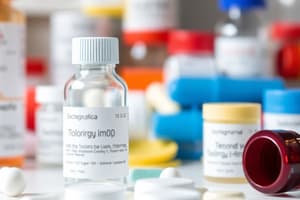Podcast
Questions and Answers
What is pharmacology?
What is pharmacology?
The study of drugs and their interaction with living systems.
What does pharmacoepidemiology deal with?
What does pharmacoepidemiology deal with?
The effects of drugs in a large population.
What is toxicology?
What is toxicology?
The study of drugs' adverse effects on the human body.
What does teratology study?
What does teratology study?
Define drugs in the context of pharmacology.
Define drugs in the context of pharmacology.
What is pharmacokinetics?
What is pharmacokinetics?
What does pharmacodynamics refer to?
What does pharmacodynamics refer to?
What is bioavailability?
What is bioavailability?
What is the first pass effect?
What is the first pass effect?
What is the clearance of a drug?
What is the clearance of a drug?
What does half-life (t1/2) mean?
What does half-life (t1/2) mean?
What is the therapeutic index?
What is the therapeutic index?
What is efficacy in pharmacology?
What is efficacy in pharmacology?
What are idiosyncratic drug reactions?
What are idiosyncratic drug reactions?
Match the terminologies with their meanings:
Match the terminologies with their meanings:
Flashcards are hidden until you start studying
Study Notes
Pharmacology Overview
- Pharmacology studies the interaction between drugs and living systems.
- Pharmacoepidemiology examines the effects of drugs on large populations.
- Toxicology focuses on the adverse effects of drugs on the human body.
- Teratology investigates damage to the fetus during development.
Key Terminologies
- Drugs: Used for the diagnosis and prevention of diseases.
- Pharmacokinetics: Involves the absorption, metabolism, and excretion of drugs.
- Pharmacodynamics: Studies the biochemical and physiological effects and mechanisms of action of drugs.
- Pharmacotherapeutics: Pertains to the treatment and prevention of diseases.
Understanding Drug Properties
- Bioavailability: Refers to the fraction of unchanged drugs that reach systemic circulation.
- Bioequivalence: Indicates biochemical similarity among drugs with the same active ingredients.
- First Pass Effect: Drugs are metabolized before reaching systemic circulation.
- First Order Elimination Kinetics: A constant proportion of drugs is eliminated per time unit.
- Volume of Distribution (Vd): Measures the apparent space in the body available to contain the drug.
Dosage and Administration
- Posology: The study of drug dosages.
- Clearance: Measures the body's ability to eliminate drugs.
- Steady State Concentration: The point where drug elimination equals drug intake.
- Loading Dose: A higher initial drug concentration to quickly achieve therapeutic levels.
- Maintenance Dose: Keeps drug concentration in the steady state.
Drug Effects and Tolerability
- Half Life (t1/2): Duration needed for the drug amount in the body to decrease by half.
- Therapeutic Index: Ratio of the toxic dose (TD50) to the effective dose (ED50) in humans.
- Efficacy: Measures a drug's ability to treat the indicated medical condition.
- Effectiveness: Assesses how well a drug works, its tolerability, and user-friendliness.
- Potency: The concentration or dose required to achieve 50% of a drug's maximum effect.
- Affinity: A drug's ability to bond with its biological target.
Unique Drug Responses
- Tolerance: Reduced response to a drug's usual dose over time.
- Tachyphylaxis: Rapid decrease in responsiveness to a drug shortly after administration.
- Overshoot/Rebound Phenomenon: Return of symptoms upon discontinuation or dosage reduction of a drug.
- Idiosyncrasy/Idiosyncratic Drug Reactions: Unpredictable adverse reactions not related to known drug effects.
- Placebo/Placebo Response: An ineffectual treatment that can produce effects due to the patient's belief in its efficacy.
Studying That Suits You
Use AI to generate personalized quizzes and flashcards to suit your learning preferences.




